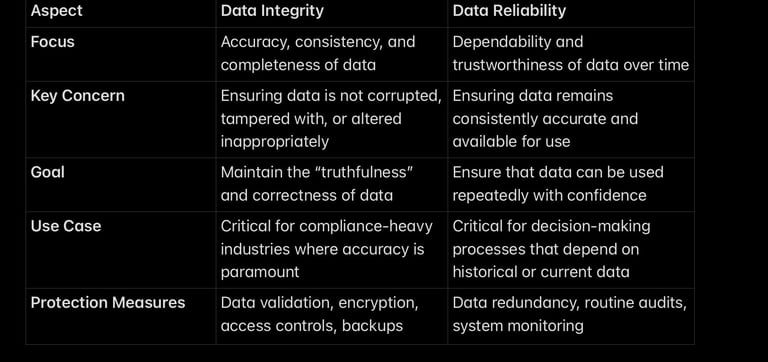Data Integrity vs. Data Reliability: What's the Difference?
Exploring the nuances between data integrity and reliability and why both are important
Kylo B
Data Integrity vs. Data Reliability: What's the Difference?
Exploring the nuances between data integrity and reliability and why both are important
In today’s data-driven world, the terms "data integrity" and "data reliability" are often used interchangeably, but they refer to different aspects of data management. Both are critical to ensuring the data that businesses rely on is accurate and dependable. Understanding the nuances between data integrity and data reliability is essential for organizations that aim to harness data for informed decision-making, operational efficiency, and competitive advantage.
This article explores the differences between data integrity and data reliability, how they relate to each other, and why both are necessary for effective data management.
What Is Data Integrity?
Data integrity refers to the accuracy, consistency, and completeness of data throughout its lifecycle. It ensures that data remains unchanged during storage, retrieval, and transfer unless legitimately altered. Data integrity is about making sure that data is not tampered with, corrupted, or lost due to system failures or unauthorized access. Simply put, it’s the quality of the data being "whole" and correct from the time it is created until the time it is used.
There are several components of data integrity:
Accuracy: Data must be correct and free from errors. If customer data in a CRM system has typos or incorrect information, it lacks integrity.
Consistency: Data should remain consistent across different systems or platforms. If a company’s financial data is recorded differently in its accounting software versus its ERP system, there is a breach of data integrity.
Completeness: All required information must be present. Missing fields in data entries or incomplete records reduce data integrity.
Validity: Data should conform to specific rules or constraints, such as the format for phone numbers, email addresses, or dates. Invalid data breaches integrity.
Ensuring data integrity requires strict controls, such as regular data validation checks, access controls, and backup systems. Data integrity is crucial in industries where compliance and regulatory requirements are strict, such as healthcare and finance.
What Is Data Reliability?
Data reliability refers to the trustworthiness of data over time. It ensures that data can be depended upon for accurate and consistent results, meaning the same data will produce the same outcomes whenever it’s accessed or analyzed. Data reliability is about whether you can consistently use data with confidence to make decisions, conduct analysis, or drive strategies.
Key characteristics of data reliability include:
Consistency Over Time: Reliable data remains consistent when accessed multiple times. If a report pulled from a database today provides different results than one generated from the same data set tomorrow, the data is not reliable.
Dependability: Data should be available and accurate when needed, without fail. System failures or discrepancies that cause downtime or misinterpretation erode data reliability.
Accuracy for Decision-Making: Reliable data allows businesses to make informed decisions. For example, if customer behavior data is unreliable, marketing strategies developed from that data may fail.
Ensuring data reliability requires robust systems for data collection, storage, and processing, along with routine checks to ensure that data remains correct and consistent over time.
Data Integrity vs. Data Reliability: The Key Differences
Though closely related, data integrity and data reliability focus on different aspects of data management. Here are the key differences:
Why Both Data Integrity and Data Reliability Matter
Both data integrity and data reliability are necessary for ensuring that organizations can use their data effectively, but they serve different purposes. A business that prioritizes one over the other risks compromising the overall value of its data.
1. Impact on Decision-Making
For businesses that rely on data to guide their decision-making processes, ensuring both data integrity and data reliability is crucial. If data is incomplete or inaccurate (lack of integrity), the decisions made based on that data will be flawed. Similarly, if data is not dependable over time (lack of reliability), organizations may make inconsistent or incorrect decisions, leading to missed opportunities or wasted resources.
For example, a retail company that analyzes unreliable sales data might overestimate demand and produce excess inventory, leading to financial losses. On the other hand, if the sales data lacks integrity—such as missing or inaccurate sales records—the company might misinterpret the actual performance of its products.
2. Compliance and Security Concerns
Data integrity is particularly important in industries subject to regulatory scrutiny, such as healthcare, finance, and government. Compliance standards like GDPR, HIPAA, and SOX require businesses to maintain accurate, complete, and secure data. Failure to uphold data integrity can result in legal penalties, fines, and reputational damage.
Data reliability, while also important for compliance, is more focused on the dependability of data over time. For example, healthcare organizations rely on accurate patient data to provide care, but they also need that data to be reliable over time to ensure long-term patient treatment and analysis.
3. Operational Efficiency
Data reliability is key to operational efficiency. When an organization’s data is reliable, employees can access and use it confidently, knowing it will produce consistent results. This leads to smoother workflows, faster decision-making, and less downtime. Unreliable data, on the other hand, can lead to rework, delayed projects, and operational bottlenecks.
Data integrity also contributes to operational efficiency by ensuring that data is accurate and complete the first time it is collected or entered into the system. Without data integrity, employees might spend excessive time correcting errors or re-entering data, reducing productivity and increasing costs.
Ensuring Data Integrity and Data Reliability
To maintain both data integrity and data reliability, organizations should implement the following best practices:
Data Validation: Ensure that data meets the required standards and follows predefined rules to prevent inaccurate or invalid data from entering the system.
Access Controls: Limit who can access and modify data to prevent unauthorized changes or accidental corruption.
Encryption: Use encryption to protect sensitive data from tampering or unauthorized access, maintaining both its integrity and security.
Routine Audits: Conduct regular audits to check for anomalies, missing data, or inconsistencies that might affect reliability or integrity.
Backup and Redundancy Systems: Regularly back up data and use redundant systems to ensure that reliable data is always available when needed.
Automated Monitoring: Use monitoring tools to detect potential issues with data integrity and reliability in real-time, enabling immediate intervention.
While data integrity and data reliability are closely related, they address different aspects of data management. Data integrity ensures that data remains accurate, consistent, and complete, while data reliability ensures that data is dependable and can be trusted over time.
Both are essential for making informed decisions, ensuring compliance, and maintaining operational efficiency. Organizations that prioritize both data integrity and reliability will be well-positioned to leverage their data as a powerful asset for growth and success.


Subscribe to our newsletter


